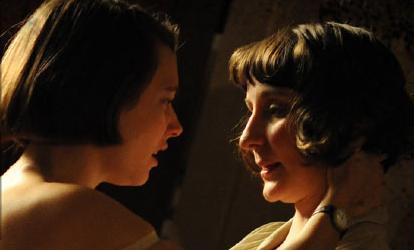“Youth is the only thing worth having,” opined Oscar Wilde but Shakespeare was closer to the mark with: “Youth’s a stuff’ll not endure.” I also quite like: ‘Youth is wasted on the young’ and ‘Gather ye rosebuds while ye may.’ The one thing these and other aphorisms have in common is a consensus that it is good to be young. Not if you are an angst ridden medical student in 1920s Vienna.
Katie Mitchell’s production of Martin Crimp’s new version of Ferdinand Bruckner’s Pains of Youth at the National Theatre charts the lives and loves of 6 young would-be doctors in the wreck of Austria between the wars. They tear metaphorical and sometimes physical strips off themselves and each other on Vicki Mortimer’s excellent, cramped Cottesloe set; a hell for claustrophobes.
The cast take turns as spectral stage hands between scenes in which they do not figure, going as far as to arrange the limbs of fellow actors before the lights flicker and a menacing buzz causes the action to recommence. The Vienna that lies outside the wood panelled lodging house where the play takes place is a character in its own right: the social and scientific phenomena of the era are fully implicated in the unfolding tragedy.
A light comedy of manners this ain’t: the clue is in the title’s first word and there is a startling intensity in both the dialogue and the performances. These six students are strangers to the anaesthetic effects of Facebook, reality TV and ready meals: the time they aren’t spending on their iPhones is concentrated with coruscating force on their feelings for each other and the futility of their lives. They take things very seriously but that is what you do when you’re young : something lost on a Friday night audience of creaking coffin dodgers who were probably alive in the 1920s. “Not a single one of them was likeable!” came the verdict of an iron-haired battleaxe: she would know.





